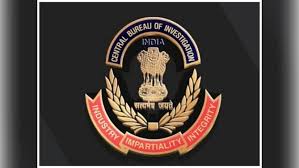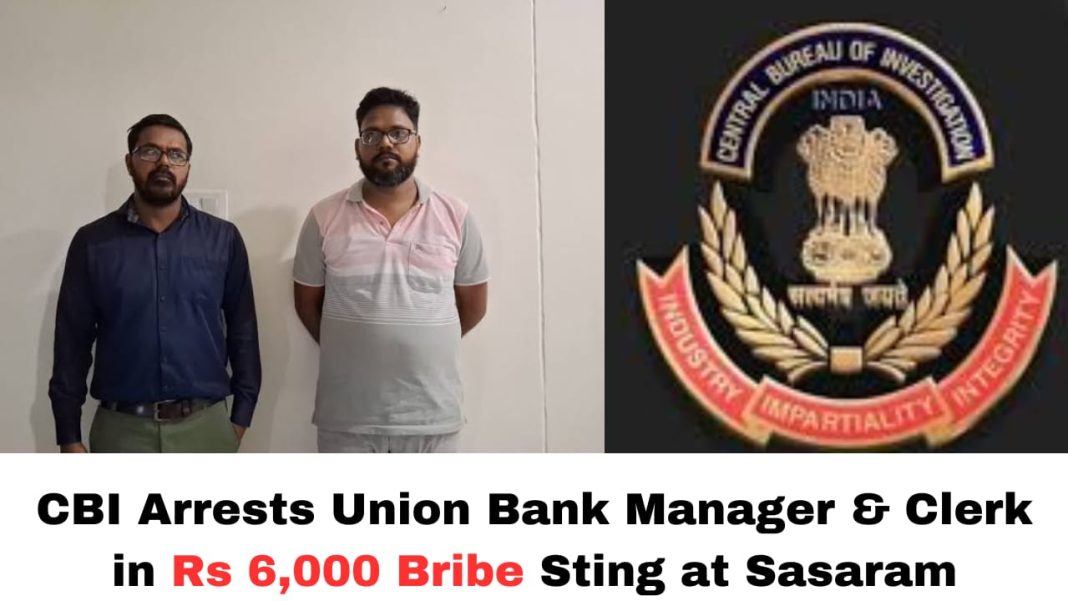Digital News Guru Bihar Desk:
CBI arrests bank manager and clerk in Sasaram bribery sting
On July 16, 2025, the Central Bureau of Investigation (CBI) executed a well‑planned operation inside the Union Bank branch in Sasaram, Bihar. Acting on a formal complaint, the agency arrested Vijay Kumar (branch manager) and Vicky Kumar (clerk) after catching them in the act of accepting a Rs 6,000 bribe from local trader Roshan Chaurasia. The money was allegedly sought in return for facilitating the approval of a Rs 3 lakh Mudra loan.

The sequence of events
- Complaint lodged: Roshan Chaurasia, a small entrepreneur, approached the CBI accusing the bank officials of demanding a bribe to process his Mudra loan application. He also alleged feeling harassed during the process.
- Complaint verification: Investigators reviewed bank records, communications, and Chaurasia’s alleged treatment before deciding to lay a trap at the branch.
- Trap execution: In a covert operation on the evening of July 16, CBI agents caught Vijay and Vicky Kumar red‑handed inside the bank premises exchanging the 6,000 bribe.
- Arrest and transfer: Both officials were immediately arrested and taken to Patna for detailed questioning and preliminary investigation.
Why the focus on Mudra loans?
The Mudra (Micro Units Development & Refinance Agency) loan scheme, launched by the Indian government in 2015, is designed to empower small and micro-enterprises with easy access to credit up to Rs 10 lakh without collateral. While the initiative has been largely successful in promoting financial inclusion, it has also proved vulnerable to misuse at local bank levels—where discretionary power over loan approvals can facilitate corrupt practices.
Context: A pattern of corruption in Sasaram
This was not an isolated incident. Just weeks earlier, in June 2025, the CBI arrested the principal of a Kendriya Vidyalaya (central government school) in Sasaram. He was found accepting a Rs 1 lakh bribe from a contractor for sanctioning funds. That arrest was also the result of a CBI sting operation and marked the second major anti-corruption action in Sasaram within a month.
Broader implications for banking governance
- Vulnerability in grassroots banking: Mudra and similar small‑loan schemes rely heavily on the integrity of local bank officials. Even small-scale graft—6,000 here, 10,000 there—can cumulatively erode public trust.
- Importance of complaints mechanism: Chaurasia’s decision to report the bribe attempt was pivotal. It highlights the significance of a whistle‑blower system and protects business owners who might feel compelled to pay under duress.
- Deterrence through sting operations: Trap-based CBI operations serve as a stark reminder to bank employees that corrupt actions will be exposed, even at modest scales.
- Potential policy ripple effects: These incidents may prompt stricter internal audits, enhanced surveillance mechanisms, and even digitized end-to-end loan processing to minimize in-person discretionary interactions.

Impact on stakeholders
For borrowers:
- Increased vigilance is likely. Borrowers may file complaints more proactively if they sense coercion.
- The fear of loan rejections could persist, risking dampened confidence in Mudra’s reach.
For banks:
- Affected branches may undergo internal reviews and system upgrades.
- Higher-level bank authorities may institute surprise inspections or periodically rotate staff.
For the CBI:
- The success of recent operations in Sasaram enhances its reputation for rooting out corruption beyond high-profile, high-value scams.
- It reinforces a message that small-time graft is not overlooked.
Looking ahead
- Legal proceedings: Vijay and Vicky Kumar will be subjected to formal charges under the Prevention of Corruption Act, followed by investigation and potential prosecution.
- Banking reforms: Union Bank—and possibly other institutions participating in the Mudra scheme—may be urged to install better grievance redressal platforms and swift, fair review committees.
- Policy upgrades: The central government might increase funding for digital loans, reducing human intervention further.
- Public awareness campaigns: NGOs and business associations could take this opportunity to educate small traders on preventing, documenting, and reporting graft.
Voices from Sasaram
Local traders, though relieved by the arrests, expressed concern over systemic issues. “If such small sums are being extorted, what stops this from being widespread?” asked one. Analysts believe this incident demonstrates the uneven application of accountability: local, low-level grafts like this often escape scrutiny until a whistle-blower comes forward.
Data snapshot
| Metric | Detail |
| Bribe amount | Rs 6,000 |
| Loan amount | Rs 3 lakh |
| Officials arrested | 2 (manager & clerk) |
| Location of arrest | Bank premises, Sasaram |
| Date | July 16, 2025 |
| Previous CBI sting | Raja–Rs 1 lakh bribe, June 2025 |
What borrowers should know
- Be aware of your rights—banks are legally bound to follow transparent processes.
- Keep records: application forms, correspondences, visit logs.
- Report suspicious behavior immediately to bank authorities or investigative agencies.
Analytical perspectives
Corruption in grassroots banking is not merely a financial crime—it’s a gatekeeper issue. If local banks can’t operate transparently, tiny businesses suffer multifold—through lost opportunities, inflated costs, and impeded growth. The Sasaram case should therefore serve both as a cautionary tale and an impetus for reform.

Final thoughts
The Rs 6,000 bribe that triggered the CBI sting may seem small, but its implications are anything but. It has exposed a structural vulnerability in India’s push for inclusive finance. It underscores the role of brave whistle‑blowers, efficient investigation agencies, and, ultimately, an engaged civil society. For meaningful reform, India needs to pair digital transformation with on-ground accountability.
You May Also Read: Kingdom Seals Rs 50 Crore OTT Rights Ahead of July 31 Release








